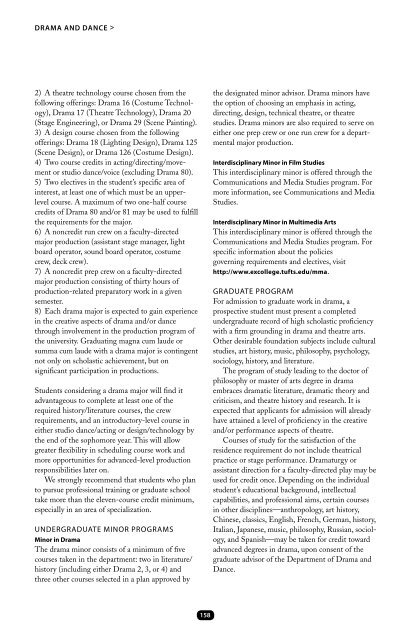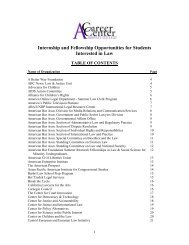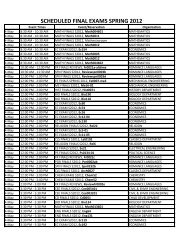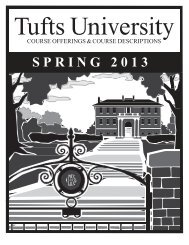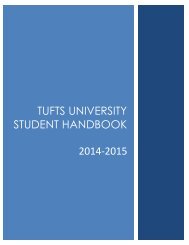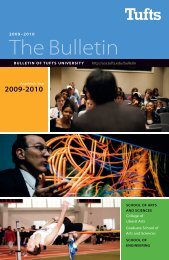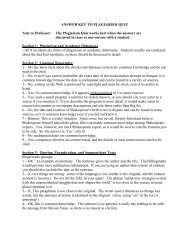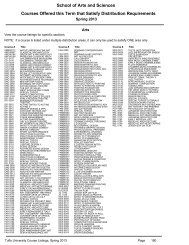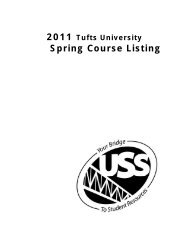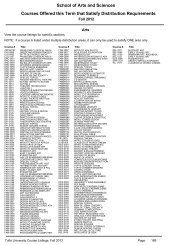2013â2014 The Bulletin - USS at Tufts - Tufts University
2013â2014 The Bulletin - USS at Tufts - Tufts University
2013â2014 The Bulletin - USS at Tufts - Tufts University
Create successful ePaper yourself
Turn your PDF publications into a flip-book with our unique Google optimized e-Paper software.
Drama and dAnce ><br />
2) A the<strong>at</strong>re technology course chosen from the<br />
following offerings: Drama 16 (Costume Technology),<br />
Drama 17 (<strong>The</strong><strong>at</strong>re Technology), Drama 20<br />
(Stage Engineering), or Drama 29 (Scene Painting).<br />
3) A design course chosen from the following<br />
offerings: Drama 18 (Lighting Design), Drama 125<br />
(Scene Design), or Drama 126 (Costume Design).<br />
4) Two course credits in acting/directing/movement<br />
or studio dance/voice (excluding Drama 80).<br />
5) Two electives in the student’s specific area of<br />
interest, <strong>at</strong> least one of which must be an upperlevel<br />
course. A maximum of two one-half course<br />
credits of Drama 80 and/or 81 may be used to fulfill<br />
the requirements for the major.<br />
6) A noncredit run crew on a faculty-directed<br />
major production (assistant stage manager, light<br />
board oper<strong>at</strong>or, sound board oper<strong>at</strong>or, costume<br />
crew, deck crew).<br />
7) A noncredit prep crew on a faculty-directed<br />
major production consisting of thirty hours of<br />
production-rel<strong>at</strong>ed prepar<strong>at</strong>ory work in a given<br />
semester.<br />
8) Each drama major is expected to gain experience<br />
in the cre<strong>at</strong>ive aspects of drama and/or dance<br />
through involvement in the production program of<br />
the university. Gradu<strong>at</strong>ing magna cum laude or<br />
summa cum laude with a drama major is contingent<br />
not only on scholastic achievement, but on<br />
significant particip<strong>at</strong>ion in productions.<br />
Students considering a drama major will find it<br />
advantageous to complete <strong>at</strong> least one of the<br />
required history/liter<strong>at</strong>ure courses, the crew<br />
requirements, and an introductory-level course in<br />
either studio dance/acting or design/technology by<br />
the end of the sophomore year. This will allow<br />
gre<strong>at</strong>er flexibility in scheduling course work and<br />
more opportunities for advanced-level production<br />
responsibilities l<strong>at</strong>er on.<br />
We strongly recommend th<strong>at</strong> students who plan<br />
to pursue professional training or gradu<strong>at</strong>e school<br />
take more than the eleven-course credit minimum,<br />
especially in an area of specializ<strong>at</strong>ion.<br />
UNDERGRADUATE MINOR ProgrAMS<br />
Minor in Drama<br />
<strong>The</strong> drama minor consists of a minimum of five<br />
courses taken in the department: two in liter<strong>at</strong>ure/<br />
history (including either Drama 2, 3, or 4) and<br />
three other courses selected in a plan approved by<br />
the design<strong>at</strong>ed minor advisor. Drama minors have<br />
the option of choosing an emphasis in acting,<br />
directing, design, technical the<strong>at</strong>re, or the<strong>at</strong>re<br />
studies. Drama minors are also required to serve on<br />
either one prep crew or one run crew for a departmental<br />
major production.<br />
Interdisciplinary Minor in Film Studies<br />
This interdisciplinary minor is offered through the<br />
Communic<strong>at</strong>ions and Media Studies program. For<br />
more inform<strong>at</strong>ion, see Communic<strong>at</strong>ions and Media<br />
Studies.<br />
Interdisciplinary Minor in Multimedia Arts<br />
This interdisciplinary minor is offered through the<br />
Communic<strong>at</strong>ions and Media Studies program. For<br />
specific inform<strong>at</strong>ion about the policies<br />
governing requirements and electives, visit<br />
http://www.excollege.tufts.edu/mma.<br />
GRADUATE ProgrAM<br />
For admission to gradu<strong>at</strong>e work in drama, a<br />
prospective student must present a completed<br />
undergradu<strong>at</strong>e record of high scholastic proficiency<br />
with a firm grounding in drama and the<strong>at</strong>re arts.<br />
Other desirable found<strong>at</strong>ion subjects include cultural<br />
studies, art history, music, philosophy, psychology,<br />
sociology, history, and liter<strong>at</strong>ure.<br />
<strong>The</strong> program of study leading to the doctor of<br />
philosophy or master of arts degree in drama<br />
embraces dram<strong>at</strong>ic liter<strong>at</strong>ure, dram<strong>at</strong>ic theory and<br />
criticism, and the<strong>at</strong>re history and research. It is<br />
expected th<strong>at</strong> applicants for admission will already<br />
have <strong>at</strong>tained a level of proficiency in the cre<strong>at</strong>ive<br />
and/or performance aspects of the<strong>at</strong>re.<br />
Courses of study for the s<strong>at</strong>isfaction of the<br />
residence requirement do not include the<strong>at</strong>rical<br />
practice or stage performance. Dram<strong>at</strong>urgy or<br />
assistant direction for a faculty-directed play may be<br />
used for credit once. Depending on the individual<br />
student’s educ<strong>at</strong>ional background, intellectual<br />
capabilities, and professional aims, certain courses<br />
in other disciplines—anthropology, art history,<br />
Chinese, classics, English, French, German, history,<br />
Italian, Japanese, music, philosophy, Russian, sociology,<br />
and Spanish—may be taken for credit toward<br />
advanced degrees in drama, upon consent of the<br />
gradu<strong>at</strong>e advisor of the Department of Drama and<br />
Dance.<br />
158


